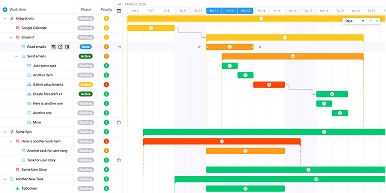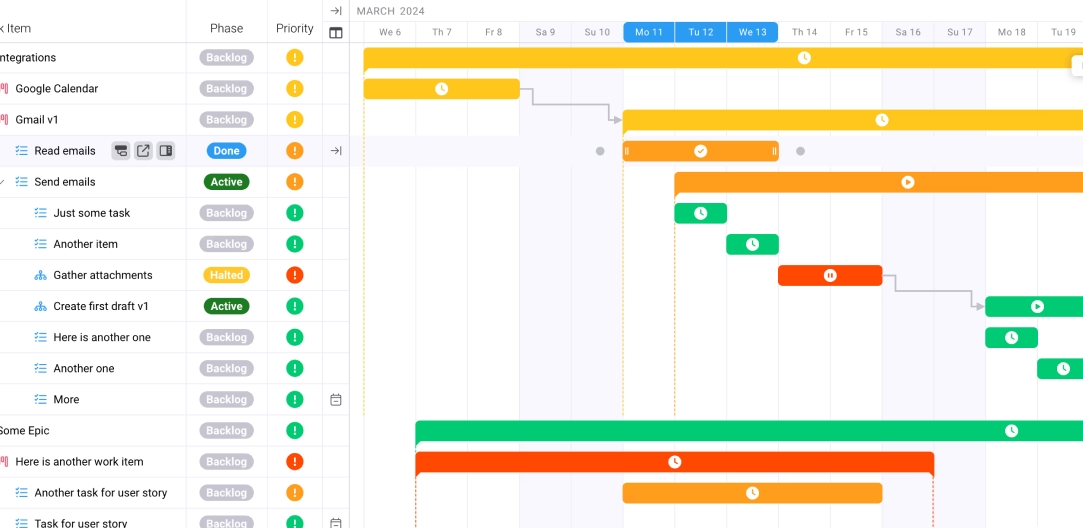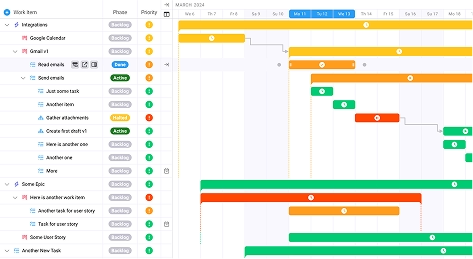
Best Practices for Project Management in Accounting Firms
Key takeaways:
- Strategic Integration: Successful accounting firms integrate project management practices with their core service delivery, creating systematic approaches that enhance both efficiency and client satisfaction
- Technology Leverage: Modern project management tools specifically designed for professional services can dramatically improve billable hour tracking, resource allocation, and client communication
- Performance Metrics: Data-driven project management enables firms to optimize utilization rates, reduce cost overruns, and make informed decisions about resource allocation and capacity planning
- Client-Centric Approach: Best-in-class firms use project management methodologies to enhance client transparency, improve deliverable quality, and strengthen long-term relationships through consistent execution
The accounting profession stands at a critical juncture where traditional approaches to project management in accounting firms are being transformed by evolving client expectations, technological advancement, and competitive pressures. Only 2.5% of companies succeed in all their projects, highlighting the urgent need for accounting firms to adopt proven best practices for project management in accounting firms that can drive consistent success and sustainable growth.
In today’s competitive landscape, accounting firms face unprecedented challenges in managing complex client engagements while maintaining profitability and quality standards. The traditional ad-hoc approach to project coordination is no longer sufficient to meet the demands of sophisticated clients who expect transparency, efficiency, and predictable outcomes from their professional service providers.
The Current Challenge – What’s Broken in Traditional Accounting Project Management
The accounting industry faces significant project management challenges that directly impact profitability and client satisfaction. Projects exceeded budgets by 75% and overran schedules by 46% across industries, with professional services firms experiencing similar patterns when proper project management practices aren’t implemented.
Many accounting firms continue to rely on outdated methods that create operational inefficiencies and missed opportunities. Email chains replace structured communication protocols, spreadsheets substitute for integrated project management systems, and manual processes consume valuable time that could be allocated to high-value client activities.
The consequences of inadequate project management extend beyond immediate operational challenges. 37% of projects fail due to lack of defined project objectives and milestones, a statistic that resonates particularly strongly in accounting environments where clarity and precision are fundamental to client satisfaction and regulatory compliance.
Professional services firms struggle with resource utilization challenges that directly impact financial performance. Professional services organizations maintain billable utilization around 71% globally, indicating significant opportunities for improvement through structured project management approaches that optimize time allocation and reduce non-productive activities.
The disconnect between project planning and execution creates additional complications for accounting firms. Without systematic approaches to scope management, timeline coordination, and quality control, firms experience scope creep, missed deadlines, and client dissatisfaction that can damage long-term relationships and referral opportunities.
Traditional billing and invoicing processes compound these challenges by creating delays between service delivery and revenue recognition. Manual time tracking systems fail to capture billable activities accurately, while disconnected invoicing processes create administrative overhead that reduces overall firm profitability.
The Strategic Framework – A Systematic Approach to Project Excellence
Successful project management in accounting firms requires a comprehensive framework that integrates planning, execution, and measurement activities into cohesive systems that support both operational efficiency and strategic objectives. This framework must address the unique characteristics of professional services delivery while incorporating proven project management principles.
The foundation begins with systematic project scoping and planning processes that establish clear objectives, deliverables, and success criteria for each client engagement. Organizations with structured project management practices achieve a 92% success rate in meeting project objectives, demonstrating the significant impact of disciplined planning approaches on project outcomes.
Effective planning incorporates work breakdown structures that decompose complex engagements into manageable work packages, enabling accurate estimation, resource allocation, and timeline development. These structures must account for both technical work activities and administrative requirements such as client communication, quality review, and compliance verification.
Resource planning represents a critical component of the strategic framework, requiring sophisticated approaches to capacity management and skill allocation. Elite accounting firms generate average net fees per equity partner of $2.4 million compared to $1.7 million for non-elite firms, highlighting the financial impact of optimized resource utilization and project management excellence.
The framework must incorporate integrated technology solutions that connect project planning with execution and measurement activities. All-in-one work management solutions eliminate inefficiencies from disconnected apps and manual processes that plague traditional accounting firm operations and create opportunities for significant productivity improvements.
Quality management processes ensure that deliverables meet client expectations and professional standards while minimizing rework and revision cycles. These processes must balance thoroughness with efficiency, incorporating review checkpoints and approval workflows that maintain quality without creating unnecessary delays.
Communication protocols establish systematic approaches to stakeholder engagement that keep clients informed, teams coordinated, and projects on track. These protocols must accommodate different stakeholder preferences while maintaining consistency and transparency throughout project execution.
Implementation Tactics – Five Essential Strategies for Accounting Firm Success
Strategy 1: Implement Systematic Time Tracking and Utilization Management
Effective time tracking forms the foundation of successful project management in accounting firms, enabling accurate billing, resource optimization, and project profitability analysis. Billable utilization rates measure percentage of time spent on revenue-generating activities, providing critical insights into firm efficiency and capacity management.
Modern time tracking approaches leverage technology to minimize administrative overhead while maximizing accuracy and completeness. Automated timers, mobile applications, and integrated project management systems enable real-time capture of billable activities without disrupting workflow efficiency.
Best practice implementations ensure that non-billable time should account for no more than 20-25% of client-facing roles’ total time, providing clear targets for performance optimization and capacity planning. Regular analysis of utilization patterns helps identify opportunities for process improvement and resource reallocation.
Strategy 2: Establish Integrated Technology Platforms
Project management tools with QuickBooks integration streamline invoicing and enhance financial tracking, eliminating manual data entry and reducing the risk of errors that can impact client relationships and financial accuracy.
Integrated platforms connect project planning, time tracking, client communication, and financial management into cohesive systems that support efficient operations. These platforms enable seamless information flow between different functional areas while maintaining data consistency and accuracy.
Selection criteria for technology platforms should prioritize accounting-specific functionality, integration capabilities with existing systems, user adoption potential, and scalability to support firm growth. Platforms designed specifically for professional services understand the unique requirements of accounting practices and provide specialized features that generic project management tools cannot match.
Strategy 3: Develop Client-Centric Communication Protocols
Systematic client communication protocols enhance transparency, manage expectations, and strengthen relationships throughout project execution. Clients demand more transparency and value, pushing firms to meticulously track every hour billed, requiring sophisticated approaches to client engagement and communication.
Client portals provide secure, self-service platforms that enable clients to access project information, review progress, and communicate with project teams in real-time. These platforms enhance client satisfaction while reducing administrative overhead for firm personnel.
Regular progress reporting, milestone communication, and proactive issue identification create positive client experiences that differentiate professional service providers in competitive markets. Structured communication templates and standardized reporting formats ensure consistency while reducing preparation time.
Strategy 4: Implement Robust Financial Controls and Project Accounting
Project accounting practices specific to accounting firms require sophisticated approaches to budget management, cost tracking, and profitability analysis. 29-39% of projects were successful from 2005-12 according to the Standish Group, highlighting the importance of financial discipline in project execution.
Real-time budget monitoring enables proactive identification of potential overruns and supports informed decision-making about scope adjustments, resource allocation, and timeline modifications. Automated alerts and dashboard reporting provide early warning systems that prevent financial surprises.
Collection rates show strong performance at an industry average of 91%, demonstrating the importance of systematic billing and collection processes that support healthy cash flow and client relationships.
Strategy 5: Establish Continuous Improvement and Performance Management Systems
Data-driven performance management enables accounting firms to optimize project outcomes through systematic analysis of efficiency metrics, client satisfaction indicators, and financial performance measures. Regular performance reviews identify best practices that can be replicated and challenges that require process improvements.
Benchmarking against industry standards and internal performance targets provides context for improvement initiatives and helps prioritize optimization efforts. Performance dashboards and analytics tools enable real-time monitoring of key performance indicators and trend analysis.
Knowledge management systems capture lessons learned, best practices, and process improvements to support organizational learning and capability development. These systems ensure that successful approaches benefit future projects and contribute to overall firm competency enhancement.
Measuring Success – KPIs and Metrics That Matter
Effective measurement systems for project management in accounting firms require comprehensive metrics that address financial performance, operational efficiency, client satisfaction, and strategic alignment. These metrics must provide actionable insights that support decision-making while remaining practical to collect and analyze.
Financial metrics form the foundation of project management measurement, including project profitability margins, budget variance analysis, and resource planning efficiency indicators. These metrics directly connect project management activities to business outcomes and enable optimization of resource allocation and pricing strategies.
Operational efficiency metrics measure the effectiveness of project management processes and identify opportunities for productivity improvement. Key indicators include project completion timeliness, scope change frequency, quality metrics such as revision rates, and team productivity measures.
Client satisfaction metrics provide essential feedback about project management effectiveness from the client perspective. These include client retention rates, referral generation, satisfaction survey results, and relationship quality indicators that predict long-term business value.
Leading indicators help predict future performance and identify potential issues before they impact project outcomes. These might include resource utilization trends, pipeline quality metrics, capacity planning indicators, and early warning signals for scope or timeline challenges.
Future Considerations – Emerging Trends and Next Steps
The future of project management in accounting firms will be shaped by technological advancement, changing client expectations, and evolving business models that require sophisticated approaches to service delivery and client engagement.
Artificial intelligence and automation technologies will increasingly support project management activities through intelligent scheduling, predictive analytics, automated reporting, and enhanced decision support systems. These technologies will enable accounting firms to optimize resource allocation while improving client service quality.
Remote work and distributed team management will require enhanced collaboration tools, virtual project coordination capabilities, and digital-first communication protocols that maintain team cohesion and client relationships across geographic boundaries.
Client self-service capabilities will continue expanding through sophisticated portal technologies, mobile applications, and integrated communication platforms that enable real-time collaboration and transparency. These capabilities will become competitive differentiators for forward-thinking accounting firms.
Integration with emerging technologies such as blockchain for audit trails, cloud computing for scalability, and data analytics for business intelligence will create new opportunities for value creation and service enhancement.
Regulatory technology (RegTech) integration will streamline compliance activities and reduce administrative overhead while improving accuracy and audit trail documentation. These technologies will become essential components of comprehensive project management platforms.
Frequently Asked Questions
How can small accounting firms implement project management without significant technology investment?
Small firms can begin with basic project management practices using existing tools, focusing on systematic time tracking, client communication protocols, and simple planning templates. Gradual adoption of cloud-based solutions provides scalable options that grow with firm needs.
What are the most common mistakes accounting firms make when implementing project management systems?
Common mistakes include choosing technology before defining processes, failing to provide adequate training and change management support, attempting to implement too many changes simultaneously, and not customizing solutions to fit specific firm workflows and client requirements.
How does project management integration affect client relationships and satisfaction?
Proper project management implementation enhances client relationships through improved communication, predictable delivery timelines, transparent progress reporting, and consistent quality outcomes. Clients appreciate the professionalism and reliability that systematic project management demonstrates.
What metrics should accounting firms prioritize when measuring project management success?
Priority metrics include billable utilization rates, project profitability margins, client satisfaction scores, and project completion timeliness. These core indicators provide comprehensive insights into operational efficiency and business impact.
How can accounting firms balance project management rigor with flexibility for changing client needs?
Successful firms implement structured frameworks that accommodate flexibility through formal change management processes, regular client check-ins, and modular project approaches that enable scope adjustments without compromising overall project integrity.
What training and development is required for successful project management implementation?
Implementation requires training in project management fundamentals, technology platform usage, client communication best practices, and firm-specific processes. Ongoing coaching and mentoring support help ensure sustainable adoption and continuous improvement.









